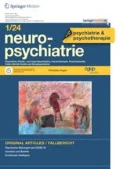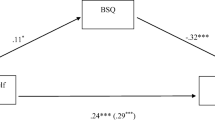Summary
Background
Perfectionism is implicated in the development and maintenance of Anorexia Nervosa and there is some evidence that perfectionism may be elevated in family members. However to date there are no studies investigating behavioural aspects of perfectionism in unaffected mothers.
Methods
Forty-one participants took part in this pilot study: 21 unaffected mothers of individuals with Anorexia Nervosa and 20 healthy control mothers. Participants completed two performance based tasks assessing perfectionism—a text replication task and a bead sorting task—along with self-report measures of perfectionism.
Results
No group differences were found between unaffected AN mothers and HC mothers on performance measures of perfectionism.
Discussion
The findings are discussed in relation to existing studies and clinical implications explored.
Zusammenfassung
Grundlagen
Perfektionismus wird mit der Entwicklung und Aufrechterhaltung von Anorexia Nervosa in Verbindung gebracht, und die Forschung deutet darauf hin, dass Perfektionismus auch bei Familienmitgliedern erhöht sein könnte. Dennoch wurden bisher keine Studien veröffentlicht, die verhaltensbezogene Aspekte von Perfektionismus bei nicht beeinträchtigten Müttern untersuchen.
Methodik
Es nahmen 41 Probandinnen an dieser Pilotstudie teil: 21 nicht beeinträchtigte Mütter von Personen mit Anorexia Nervosa und 20 gesunde Kontrollmütter. Die Probanden absolvierten zwei leistungsbasierte Tests zur Erhebung von Perfektionismus – eine Text-Reproduktions-Aufgabe und eine Perlen-Sortier-Aufgabe – und einen Selbstbericht zur Erhebung von Perfektionismus.
Ergebnisse
Es wurden keine Gruppenunterschiede zwischen nicht beeinträchtigten Müttern von Personen mit AN und Kontrollmüttern bezüglich des leistungsbezogenen Perfektionismus gefunden.
Diskussion
Die Ergebnisse werden in Bezug auf bereits vorhandene Studien und klinische Implikationen diskutiert.

Similar content being viewed by others
References
American Psychological Association. The diagnostic and statistical manual of mental disorders: DSM 5. Arlington: VA; 2013.
Arcelus J, Mitchell AJ, Wales J, Nielsen S. Mortality rates in patients with anorexia nervosa and other eating disorders: a meta-analysis of 36 studies. Arch Gen Psychiatry. 2011;68(7):724–31.
Sullivan PF. Mortality in anorexia nervosa. Am J Psychiatry. 1995;152:1073–4.
Tchanturia K, Hambrook D, Curtis H, Jones T, Lounes N, Fenn K, et al. Work and social adjustment in patients with anorexia nervosa. Compr Psychiatry. 2013;54(1):41–5.
Zabala MJ, Macdonald P, Treasure J. Appraisal of caregiving burden, expressed emotion and psychological distress in families of people with eating disorders: a systematic review. Eur Eat Disord Rev. 2009;17(5):338–49.
Bulik CM, Berkman ND, Brownley KA, Sedway JA, Lohr KN. Anorexia nervosa treatment: a systematic review of randomized controlled trials. Int J Eat Disord. 2007;40(4):310–20.
NICE. Eating disorders: core interventions in the treatment and management of anorexia nervosa, bulimia nervosa and related eating disorders. NICE guidelines (CG9). National Institute for Health and Care Excellence; 2004.
Bulik CM, Sullivan PF, Tozzi F, Furberg H, Lichtenstein P, Pedersen NL. Prevalence, heritability, and prospective risk factors for anorexia nervosa. Arch Gen Psychiatry. 2006;63(3):305–12.
Wade TD, Bulik CM, Neale M, Kendler KS. Anorexia nervosa and major depression: shared genetic and environmental risk factors. Am J Psychiatry. 2000;157(3):469–71.
Lilenfeld LR, Kaye WH, Greeno CG, Merikangas KR, Plotnicov K, Pollice C, et al. A controlled family study of anorexia nervosa and bulimia nervosa: psychiatric disorders in first-degree relatives and effects of proband comorbidity. Arch Gen Psychiatry. 1998;55(7):603–10.
Fairburn CG, Shafran R, Cooper Z. A cognitive behavioural theory of anorexia nervosa. Behav Res Ther. 1999;37(1):1–13.
Schmidt U, Treasure J. Anorexia nervosa: valued and visible. A cognitive-interpersonal maintenance model and its implications for research and practice. Br J Clin Psychol. 2006;45(3):343–66.
Lilenfeld LR. Personality and temperament. Curr Top Behav Neurosci. 2011;6:3–16.
Bardone-Cone AM. Self-oriented and socially prescribed perfectionism dimensions and their associations with disordered eating. Behav Res Ther. 2007;45(8):1977–86.
Egan SJ, Wade TD, Shafran R. Perfectionism as a transdiagnostic process: a clinical review. Clin Psychol Rev. 2011;31(2):203–12.
Davies H, Liao P-C, Campbell I, Tchanturia K. Multidimensional self reports as a measure of characteristics in people with eating disorders. Eating and Weight Disorders-Studies on Anorexia. Bulimia Obesity. 2009;14(2–3):e84–91.
Bulik CM, Tozzi F, Anderson C, Mazzeo SE, Aggen S, Sullivan PF. The relation between eating disorders and components of perfectionism. Am J Psychiatry. 2003;160(2):366–8.
Tozzi F, Aggen SH, Neale BM, Anderson CB, Mazzeo SE, Neale MC, et al. The structure of perfectionism: a twin study. Behav Genet. 2004;34(5):483–94.
Flett GL, Hewitt PL, Oliver JM, Macdonald S. Perfectionism in children and their parents: A developmental analysis. In: Flett G, Hewitt P, editors. Perfectionism: Theory, research and treatment.Washington, DC: American Psychological Association; 2002. p. 89-132.
Hamachek DE. Psychodynamics of normal and neurotic perfectionism. Psychology: A Journal of Human Behavior. 1978;15(1):27–33.
Maloney GK, Egan SJ, Kane RT, Rees CS. An etiological model of perfectionism. PLoS One. 2014;9(5):e947–57.
Vieth AZ, Trull TJ. Family patterns of perfectionism: an examination of college students and their parents. J Pers Assess. 1999;72(1):49–67.
Frost RO, Lahart CM, Rosenblate R. The development of perfectionism: a study of daughters and their parents. Cogn Ther Res. 1991;15(6):469–89.
Fassino S, Svrakic D, Abbate-Daga G, Leombruni P, Amianto F, Stanic S, et al. Anorectic family dynamics: temperament and character data. Compr Psychiatry. 2002;43(2):114–20.
Woodside BD, Bulik CM, Halmi KA, Fichter MM, Kaplan A, Berrettini WH, et al. Personality, perfectionism, and attitudes toward eating in parents of individuals with eating disorders. Int J Eat Disord. 2002;31(3):290–9.
Jacobs MJ, Roesch S, Wonderlich SA, Crosby R, Thornton L, Wilfley DE, et al. Anorexia nervosa trios: behavioral profiles of individuals with anorexia nervosa and their parents. Psychol Med. 2009;39(03):451–61.
Lloyd S, Yiend J, Schmidt U, Tchanturia K. Perfectionism in anorexia nervosa: novel performance based evidence. PLoS One. 2014b;9(10):e1116–97.
Treasure J, Schmidt U. The cognitive-interpersonal maintenance model of anorexia nervosa revisited: a summary of the evidence for cognitive, socio-emotional and interpersonal predisposing and perpetuating factors. J Eat Disord. 2013;1(13):10.
Zucker N, Marcus M, Bulik C. A group parent-training program: a novel approach for eating disorder management. Eat Weight Disord. 2006;11(2):78–82.
Ohmann S, Popow C, Wurzer M, Karwautz A, Sackl-Pammer P, Schuch B. Emotional aspects of anorexia nervosa: results of prospective naturalistic cognitive behavioral group therapy. Neuropsychiatrie. 2013;27(3):119–28.
Lloyd S, Fleming C, Schmidt U, Tchanturia K. Targeting perfectionism in anorexia nervosa using a group‐based cognitive behavioural approach: a pilot study. Eur Eat Disord Rev. 2014c;22(5):366–72.
Yiend J, Savulich G, Coughtrey A, Shafran R. Biased interpretation in perfectionism and its modification. Behav Res Ther. 2011;49(12):892–900.
Bouchard C, Rhéaume J, Ladouceur R. Responsibility and perfectionism in OCD: an experimental study. Behav Res Ther. 1999;37(3):239–48.
Frost RO, Marten P, Lahart C, Rosenblate R. The dimensions of perfectionism. Cogn Ther Res. 1990;14(5):449–68.
Enns MW, Cox BJ. The nature and assessment of perfectionism: A critical analysis. In: Flett G, Hewitt P, editors. Perfectionism: Theory, research and treatment. Washington, DC: American Psychological Association; 2002. p. 33-62.
Frost RO, Marten P, Lahart C, Rosenblate R. The dimensions of perfectionism. Cogn Ther Res. 1990;14(5):449–68.
Riley C, Lee M, Cooper Z, Fairburn CG, Shafran R. A randomised controlled trial of cognitive-behaviour therapy for clinical perfectionism: a preliminary study. Behav Res Ther. 2007;45(9):2221–31.
Dickie L, Surgenor LJ, Wilson M, McDowall J. The structure and reliability of the Clinical Perfectionism Questionnaire. Pers Individ Dif. 2012;52(8):865–9.
Egan SJ, Shafran R, Lee M, Fairburn CG, Cooper Z, Doll HA, et al. The reliability and validity of the clinical perfectionism questionnaire in eating disorder and community samples. Behav Cogn Psychother. 2014:1–13.
Fairburn CG, Beglin SJ. Assessment of eating disorders: interview or self‐report questionnaire? Int J Eat Disord. 1994;16(4):363–70.
Mond JM, Hay P, Rodgers B, Owen C. Eating Disorder Examination Questionnaire (EDE-Q): norms for young adult women. Behav Res Ther. 2006;44(1):53–62.
Mond JM, Hay PJ, Rodgers B, Owen C, Beumont P. Validity of the Eating Disorder Examination Questionnaire (EDE-Q) in screening for eating disorders in community samples. Behav Res Ther. 2004;42(5):551–67.
Berg KC, Peterson CB, Frazier P, Crow SJ. Psychometric evaluation of the eating disorder examination and eating disorder examination‐questionnaire: a systematic review of the literature. Int J Eat Disord. 2012;45(3):428–38.
Zigmond AS, Snaith RP. The hospital anxiety and depression scale. Acta Psychiatr Scand. 1983;67(6):361–70.
Bjelland I, Dahl AA, Haug TT, Neckelmann D. The validity of the Hospital Anxiety and Depression Scale: an updated literature review. J Psychosom Res. 2002;52(2):69–77.
Zigmond AS, Snaith RP. The hospital anxiety and depression scale. Acta Psychiatr Scand. 1983;67(6):361–70.
Foa EB, Huppert JD, Leiberg S, Langner R, Kichic R, Hajcak G, et al. The Obsessive-Compulsive Inventory: development and validation of a short version. Psychol Assess. 2002;14(4):485.
Abramowitz JS, Deacon BJ. Psychometric properties and construct validity of the Obsessive-Compulsive Inventory—Revised: replication and extension with a clinical sample. J Anxiety Disord. 2006;20(8):1016–35.
Southgate L, Tchanturia K, Collier D, Treasure J. The development of the childhood retrospective perfectionism questionnaire (CHIRP) in an eating disorder sample. Eur Eat Disord Rev. 2008;16(6):451–62.
Mundt JC, Marks IM, Shear MK, Greist JM. The Work and Social Adjustment Scale: a simple measure of impairment in functioning. Br J Psychiatry. 2002;180(5):461–4.
First MB. Structured Clinical Interview for DSM-IV-TR Axis I Disorders: SCID-I. New York: Biometrics Research Department, New York State Psychiatric Institute; 2007.
Wechsler D. Wechsler Abbreviated Scale of Intelligence. 2.edn. San Antonio: NCS Pearson; 2011.
Woodside DB, Bulik CM, Halmi KA, Fichter MM, Kaplan A, Berrettini WH, et al. Personality, perfectionism, and attitudes toward eating in parents of individuals with eating disorders. Int J Eat Disord. 2002;31(3):290–9.
Strober M, Freeman R, Lampert C, Diamond J. The association of anxiety disorders and obsessive compulsive personality disorder with anorexia nervosa: evidence from a family study with discussion of nosological and neurodevelopmental implications. Int J Eat Disord. 2007;40(S3):46–51.
Srinivasagam NM, Kaye WH, Plotnicov KH, Greeno C, Weltzin TE, Rao R. Persistent perfectionism, symmetry, and exactness after long-term recovery from anorexia nervosa. Am J Psychiatry. 1995;152(11):1630–4.
Bastiani AM, Rao R, Weltzin T, Kaye WH. Perfectionism in anorexia nervosa. Int J Eat Disord. 1995;17(2):147–52.
Pollice C, Kaye WH, Greeno CG, Weltzin TE. Relationship of depression, anxiety, and obsessionality to state of illness in anorexia nervosa. Int J Eat Disord. 1997;21(4):367–76.
Holliday J, Uher R, Landau S, Collier D, Treasure J. Personality pathology among individuals with a lifetime history of anorexia nervosa. J Personal Disord. 2006;20(4):417–30.
Bardone‐Cone AM, Sturm K, Lawson MA, Robinson DP, Smith R. Perfectionism across stages of recovery from eating disorders. Int J Eat Disord. 2010;43(2):139–48.
Crane AM, Roberts ME, Treasure J. Are obsessive‐compulsive personality traits associated with a poor outcome in anorexia nervosa? A systematic review of randomized controlled trials and naturalistic outcome studies. Int J Eat Disord. 2007;40(7):581–8.
Ball J, Mitchell P. A randomized controlled study of cognitive behavior therapy and behavioral family therapy for anorexia nervosa patients. Eat Disord. 2004;12(4):303–14.
Paulson-Karlsson G, Engström I, Nevonen L. A pilot study of a family-based treatment for adolescent anorexia nervosa: 18-and 36-month follow-ups. Eat Disord. 2008;17(1):72–88.
Hurst K, Zimmer‐Gembeck M. Focus on perfectionism in female adolescent anorexia nervosa. Int J Eat Disord. 2015. doi: 10.1002/eat.22417.
Acknowledgements
The authors would like to acknowledge the NIHR BiomedicalResearch Centre (BRC) for Mental Health atSouth London and Maudsley NHS Foundation Trust andKing’s College London.
Author information
Authors and Affiliations
Corresponding author
Appendices
Conflict of interest
The views expressed are those of the author(s) and notnecessarily those of the NHS, the NIHR or the Departmentof Health. SL is supported by an Institute of Psychiatry/Medical Research Council Excel- lence PhDstudentship. KL is supported by a Biomedical ResearchCouncil PhD studentship. US receives salary supportfrom the BRC. KT and SL would like to acknowl- edgesupport from the Swiss Anorexia Foundation.
Samantha Lloyd, Ulrike Schmidt, Mima Simic andKate Tchanturia declare that they have no conflict ofinterest.
Ethical standards
Full ethical approval for this study was granted bythe NRES Committee, London (12/LO/2013). Writteninformed consent was obtained from all participants. Allprocedures followed were in accordance with the ethicalstandards of the responsible committee on humanexperimentation (institutional and national) and withthe Helsinki Declaration of 1975, as revised in 2008 (5).
Rights and permissions
About this article
Cite this article
Lloyd, S., Schmidt, U., Simic, M. et al. Self-reported and performance based perfectionism in mothers of individuals with Anorexia Nervosa: a pilot study. Neuropsychiatr 29, 192–199 (2015). https://doi.org/10.1007/s40211-015-0161-y
Received:
Accepted:
Published:
Issue Date:
DOI: https://doi.org/10.1007/s40211-015-0161-y



